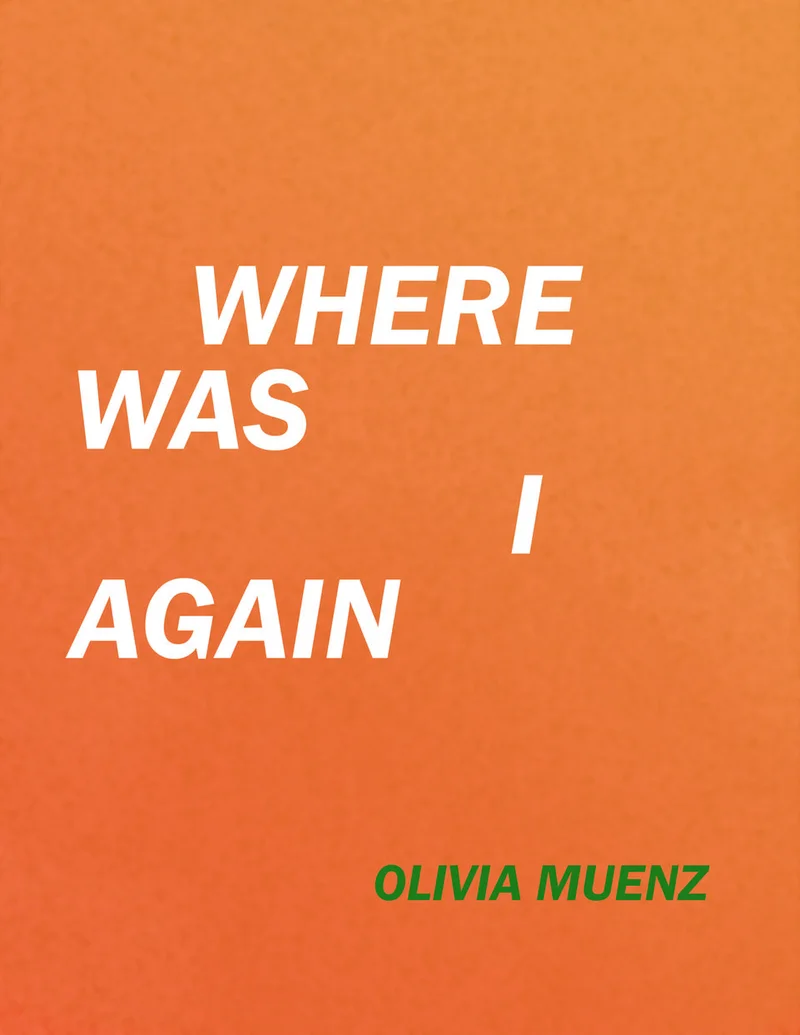|
The Breadcrumbs widget will appear here on the published site.
By Alex Carrigan In her debut poetry chapbook Where Was I Again, Olivia Muenz presents two long poems to discuss matters such as loss, disability, alienation, and more. The chapbook consists of just a preface and the two poems, but does an incredible job making the reader find themselves in the mind of a neurodivergent speaker. The pieces were written while Muenz was bedridden from illness for several months, and shows what can emerge as one tries to keep themselves together in such a state. The chapbook's main structure is quite fascinating in how simple its approach is, but how complex the result is. The two poems, "I'm here" and "But not," are written in short paragraphs, each beginning with the same sentence structure of "Here is..." for the former and "But..." for the latter. Each sentence can stop and start at any point, which can be a bit of a lurch to some readers, but Muenz's work shows how full stops can change tone and meaning, while also working into her greater themes. "I'm here" follows the speaker's recollection and interpretation of a relationship. It starts fairly grounded, with Muenz writing "Here is the world. We are in this together. The body pulls. In towards itself and towards all of us." However, before the first stanza ends, the uncertainty and self doubt sets in, with "Am I doing this right. Where was I again." Throughout the entire collection, the speaker asks questions, although question marks are not used whatsoever in the entire chapbook. This seems to suggest that it's not that the speaker is trying to ask questions or ask for an answer, but is settled into a perpetual state of uncertainty that they know any question they have is more of a statement for where they are. The rest of this poem focuses on where the speaker and their partner are in relation to each other physically and emotionally. It's a lot of "Here I..." and "Here you..." statements that start to become a lot more obtuse and surreal as they progress. We see the emotion the speaker feels as the relationship falls apart, where some pages dissolve into single sentences like "Here comes trouble." At the end, the relationship is over, but the speaker seems to have accepted its place in their history, stating "I don’t know why but I knew. I will save them for us forever. We will live on forever." When "But not" starts, it feels more like a conversational piece. While there are still no questions asked, the speaker is continually flip flopping between ideas. This piece also continues the idea of a balloon as the speaker, with many images and lines relating to a balloon inflating or popping. This suggests the speaker sees themself as something that is made to change and absorb, but ultimately can't contain it all. "But I woke up as a balloon. What I really needed. Was broth. What I really need is a talking to," Muenz writes at one point. Compared to the previous piece, "But not" feels more desperate and in need of responses from whoever the speaker is speaking to. There's an air of worry and a need for the speaker to receive assurances or answers ("Should I get it checked out. Should I bring it up again."). While the previous poem felt like an acceptance of the way things are from the speaker's point of view, this one feels more like the times when one can't find acceptance in their worldview and continues to ask and look for some hope or guidance. While it ends a lot more openly than the last, "But not" makes its alienation and discomfort quite palpable the entire time. Muenz's chapbook is a strong work of showing a neurodivergent mindset, and her clever writing style illustrates how alienating it can be at times. Despite this, the work shows the power of language and how we address and communicate with one another. It shows the importance of how we deliver our words and thoughts, and how even a single period can change how we respond to one another.
0 Comments
CommentsYour comment will be posted after it is approved.
Leave a Reply. |
AuthorWrite something about yourself. No need to be fancy, just an overview. Archives
March 2024
Categories
All
|



 RSS Feed
RSS Feed






